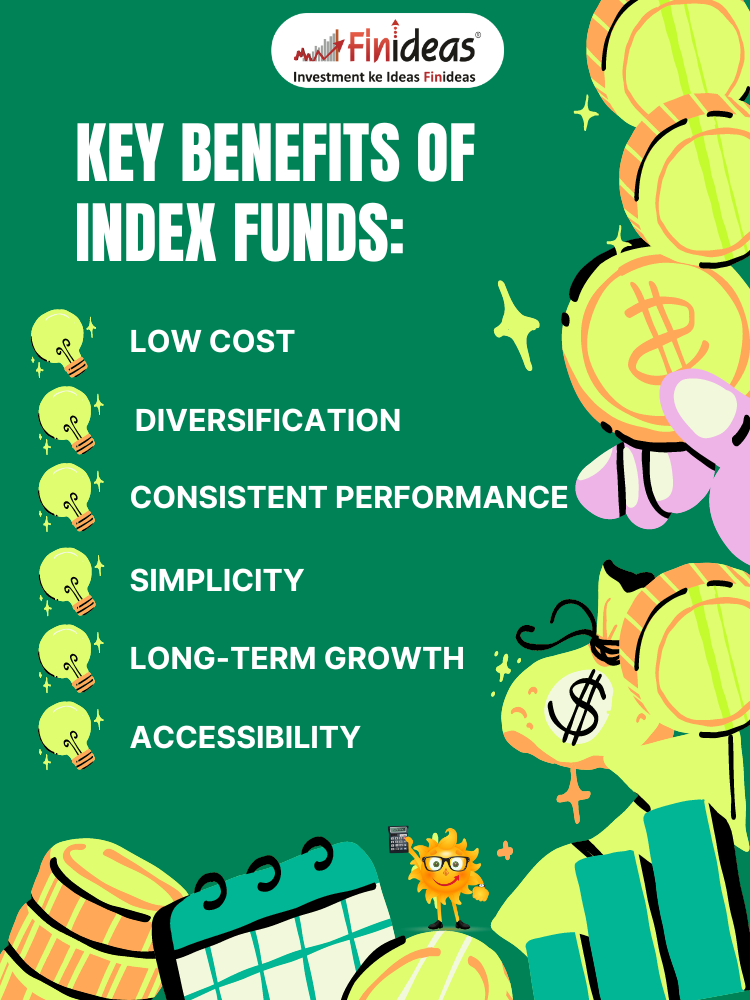Why Index Funds Are the Future of Smart Investing
Investing in the stock market can be daunting, especially when trying to pick individual stocks that will outperform the market. However, index funds offer a more straightforward and often more effective way to invest. But why are they considered the future of smart investing?
What Are Index Funds and How Do They Work?
Index funds are mutual funds or exchange-traded funds (ETFs) designed to replicate the performance of a specific market index, such as the NIFTY 50 or the Sensex. Instead of trying to beat the market by selecting individual stocks, index funds aim to match the market’s returns by holding all the stocks in the index.
For example, if you invest in a NIFTY 50 index fund, your investment is spread across 50 of the largest companies in India, giving you a diversified portfolio that mirrors the performance of the NIFTY 50 index.
Why Are Index Funds Cost-Effective?
One of the key reasons index funds are gaining popularity is their low cost. But how does this translate into better returns?
Unlike actively managed funds, where fund managers make decisions about buying and selling stocks, index funds follow a passive investment strategy. This results in lower management fees and operating costs. Over time, these lower costs can significantly boost your overall returns.
For instance, if you invest ₹1,00,000 in an index fund with an annual expense ratio of 0.20%, you would pay only ₹200 in fees per year. In contrast, an actively managed fund with a 1.5% expense ratio would cost you ₹1,500 annually.
How Do Index Funds Provide Diversification?
Diversification is a fundamental principle of investing, and index funds offer a simple way to achieve it. But how do they do this effectively?
By investing in an index fund, you automatically gain exposure to a broad range of companies across various sectors. This diversification reduces the risk of your investment being severely impacted by the poor performance of a single company or sector.
For example, the NIFTY 50 index includes companies from different sectors like technology, finance, healthcare, and consumer goods. This mix helps balance the performance of your investment, as the gains in one sector can offset losses in another.
Can Index Funds Outperform Actively Managed Funds?
While it might seem counterintuitive, many index funds have outperformed actively managed funds over the long term. But how is this possible?
Actively managed funds often struggle to consistently beat the market due to higher fees and the difficulty of making accurate stock picks. In contrast, index funds, by merely tracking the market, have a better chance of delivering solid returns over time.
For instance, over the past decade, many NIFTY 50 index funds have delivered average annual returns of around 12-15%, which is competitive with, if not better than, the performance of many actively managed equity funds.
What Is the Index Long Term Strategy of Finideas?
Looking for a strategy that can help you build substantial wealth over time? Finideas offers an Index Long Term Strategy (ILTS) that is designed to leverage the power of index funds for long-term growth.
The ILTS focuses on consistent investment in index funds like the NIFTY 50, combined with periodic reviews and adjustments to optimize returns. By sticking to this disciplined approach, investors can potentially build significant wealth, even reaching figures like ₹100 crores, as demonstrated in various case studies.
Why Are Index Funds Ideal for Long-Term Investors?
Long-term investing is about patience and persistence. But why are index funds particularly suited for this approach?
Index funds are ideal for long-term investors because they benefit from the compounding of returns over time. By holding onto your investment through market ups and downs, you can ride the wave of market growth, which historically trends upwards.
For example, if you invest ₹10 lakhs in a NIFTY 50 index fund and it grows at an average annual rate of 12%, your investment could grow to over ₹31 lakhs in 10 years, thanks to the power of compounding.
Key Benefits of Index Funds:
- Low Cost: Minimal management fees due to passive investing strategy.
- Diversification: Broad exposure to multiple sectors, reducing risk.
- Consistent Performance: Often outperforms actively managed funds over the long term.
- Simplicity: Easy to understand and manage, ideal for beginner investors.
- Long-Term Growth: Benefits from the compounding of returns over time.
- Accessibility: Available for various market indices like NIFTY 50 and Sensex.
Is Now the Right Time to Invest in Index Funds?
With the growing popularity of index funds, you might wonder if now is the right time to start investing. The good news is that index funds are designed to be long-term investments, so the best time to invest is often now.
By starting early, you give your investments more time to grow, and you can take advantage of the market’s long-term upward trajectory. Whether the market is at a high or low point, index funds provide a balanced and effective way to grow your wealth over time.
Do you believe index funds are the future of smart investing? Share your thoughts and experiences in the comments below!
Happy Investing!
This article is for education purpose only. Kindly consult with your financial advisor before doing any kind of investment..


